Part l
One of history's most tragic and comprehensive acts of genocide takes place on the island of Chios in 1822. The Greek War of Independence begins in 1821. But the Orthodox population of peaceful and prosperous Chios, lying just off the coast of Turkey, finds itself caught between the competing nationalist ambitions of the old Turkish Ottoman Empire and the fledgling new state of Greece. A year later, during the Massacres around 20,000 islanders are hanged, butchered, starved or tortured to death. Untold thousands more are raped, deported and enslaved. The Greek word katastrofi – also meaning 'destruction' and 'ruin' – is usually used to describe these events. The island itself is devastated and the few survivors disperse throughout Europe in what is now known as the Chios Diaspora.
Page 1 – Introduction & 1814-1821
Page 2 – Events & Massacres of 1822
Page 3 – Events from 1823 Onwards & Documentation
Page 4 – The Chios Diaspora 1823-99
Page 5 – The Chios Diaspora 1900-99
The Island Of Chios
Vlasto Family Properties On Chios
A Warning To Anyone Planning To Visit Chios
Who Are Your People? The Chiot & Phanariot Diaspora
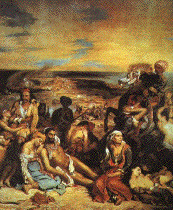
Scenes from The Massacre At Chios
by Eugène Delacroix, first exhibited in 1824, two years after the massacre, and bought by King Charles X for The Louvre in Paris.
This and the works of Lord Byron did much to draw the attention of mainland Europe to the 'katastrophe' that had taken place on Chios.
It also captured the imagination of the author who was introduced to it quite suddenly, in 1961, at the age of twelve.
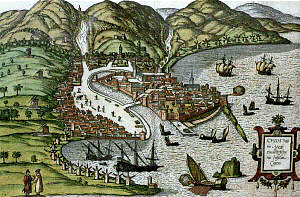
B
y 1822 the determination among Aegean and mainland Greeks for independence from what they saw as the tyranny of their Turkish masters, the Ottoman Empire, was irresistible. The insurrection that led to The Greek War of Independence was mounting throughout what was soon to become the new state of Greece. But the relatively large and fabulously prosperous island of Chios, lying just off the Turkish coast, was a prize the Ottomans could under no circumstances afford to lose.
Chios and its sophisticated Greek population was arguably the richest shipping and trading centre in the eastern Mediterranean. For two thousand years its merchants and
ship-owners had dominated trade and diplomacy throughout the Black Sea, the Aegean and the Mediterranean. Wisely, the Ottomans had allowed Chios unique and almost complete control over its own affairs. Chian trade and the curious fact that the immensely valuable 'mastic' plant was harvested only in Chios, were of great value to the Sultan. The cosmopolitan Chians were also in any case very prominent in Constantinople.
When Chios too was encouraged to join the rebellion against the Turks, the Chians wavered. What would be the price of antagonising Constantinople? Would they be any better placed as part of a new Greek state?
In the end they were never given the chance to decide. The Turks panicked at the mere prospect of losing the island and the Sultan in Constantinople ordered its formerly benign Turkish governor to unleash a campaign of terror and vengeance which has few parallels in history. The slaughter and atrocities committed on Chios (and two years later on the neighbouring island of Psara) shocked all of Europe, while the depiction of this suffering by painters such as Delacroix soon brought the excesses to public attention.
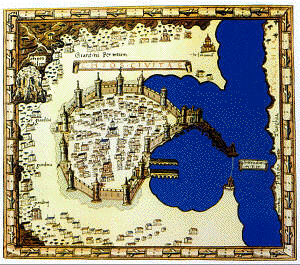 What makes this story particularly tragic is that tiny Chios is probably the first victim of a turning-point in history – the watershed between the disappearance of the age-old 'trade' empires and the emergence of the new 'national' empires.
What makes this story particularly tragic is that tiny Chios is probably the first victim of a turning-point in history – the watershed between the disappearance of the age-old 'trade' empires and the emergence of the new 'national' empires.
The great 'trade' empires of Greece, Rome, Genoa, Venice, the Ottomans, etc., were largely concerned with acquiring monopoly access to produce, ports and markets – seldom imposing any particular social, religious or cultural status on their colonial populations. Not being 'citizens' of the occupying capital city nor 'subjects' of its state, people throughout Europe merely identified themselves as residents of a particular city or island (in this case as Chians or Chiots).
By contrast the new emerging 'nations' such as Britain, Russia and France – obsessed by 'nationality', lines on printed maps and, eventually, passports – were now beginning to require their colonial populations to identify themselves as 'subjects' of the occupying power within defined national borders.
It's interesting to note the British Foreign Secretary's reference (9th July 1822) to the way Turkish atrocities filled the British Nation with horror and disgust
. Now 'nations' speak for all their subjects rather than the King and his government alone.
What remains unclear is whether Michael Vlasto, demogeront on Chios in the crucial year 1821-22 – and the last– appreciates that he is being asked to choose between an old and a new world order.
He is certainly aware that Chios is a pathetically vulnerable nut between the massive jaws of Turkey and the emerging Greek nation, backed by the colossal 'national' powers of Britain, Russia and France.
He may hope that common sense will prevail: that his extended family of Chians will eventually be left in peace to resume lives as free citizens of a world they have done much to develop and where they have always felt free to trade, roam and settle. If this is so, a similarly innocent or naïve miscalculation is made long afterwards by Armenians, Kurds and the predominantly Muslim leadership in Sarajevo in 1991-92.
 Michael Vlasto (1762-1849)
Michael Vlasto (1762-1849)
The last Demogeront of Chios in 1822.
This magnificent portrait is carved in stone on his tomb at the Greek Orthodox cemetery in Trieste where he died in exile.
Few men can have faced a dilemma as appalling as that presented to him in 1821-22.
Should he accept the demand of the Turkish authorities to hand over his family and closest friends as hostages – aware that they might well be assassinated? By doing so he might hope to ensure the freedom of their families and remainder of the islanders.
Should he refuse the Turkish demand – a clear sign of rebellion – he risked the wholesale slaughter of the entire population? In the end both catastrophes befell him and his people.
Whatever the perception at the time, the outcome was stark: one of history's most tragic and comprehensive acts of genocide took place. Around 20,000 islanders were hanged, butchered, starved or tortured to death. Untold thousands were raped, deported or enslaved. Hundreds more were murdered or burnt alive as they sought sanctuary in the monastery of Nea Moni.
To this day the Greek word katastrofi – also meaning 'destruction' and 'ruin' – is usually used to describe these events. The island itself was devastated and the few survivors dispersed throughout Europe in what became known as the Chios Diaspora.
In the long run the appalling massacres on Chios and the degradation of its few survivors did irreparable damage to both Turkey and Greece. The island and its source of wealth was devastated and though the drive for Greek Independence was given fresh impetus and justification, the surviving Chians never forgot that 'fellow Greeks' participated in the rape of their island.
The survivors formed a diaspora which eventually re-established shipping, trading and banking empires elsewhere throughout Europe. The new Greek state was thus deprived of entrepreneurial skills and revenues it desperately needed.
Finally, the already tarnished reputation of the Ottoman Turks was damaged for ever more – the very word 'Turk' becoming an international synonym for a peculiarly mediaeval brand of inhumanity and brutality – leaving relations between Greece and Turkey dangerously strained to this day. – C. A. L. (1998)
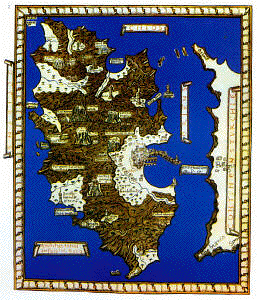 Chios, lies a couple of miles off the Turkish coast.
Chios, lies a couple of miles off the Turkish coast.
Ever since 1566, despite its predominantly Orthodox population, the island has, like the rest of modern-day Greece, been a colony of the vast Ottoman Empire.
By 1822 Chians might prefer independence but they have 1,000 years of vital cultural and social and economic connections with the Ottoman capital, Constantinople.
Now mainland Greece and many Aegean islands are clamouring for rebellion against the Ottomans.
What should the Chians do? Dangerously close to the Turkish mainland, they regard themselves as neither Ottomans nor Greeks, having little connection with the city of Athens.
In March 1821 they have to choose between two distant capitals... by December time runs out katastrophe beckons...
A map of Chios by Henrici Martelli Germani in 1470 ('Insularum Illustratum': The British Museum)
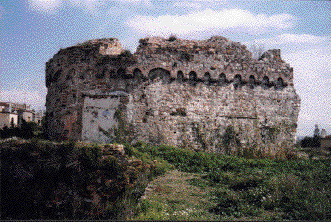 1814-1821 – In the vacuum created by the defeat of Napoleon, a secret organisation, the Philike Hetairia (the largely Russian-backed Friendly Society), has been encouraging Greeks aspirations to independence from Turkish Ottoman Empire.
1814-1821 – In the vacuum created by the defeat of Napoleon, a secret organisation, the Philike Hetairia (the largely Russian-backed Friendly Society), has been encouraging Greeks aspirations to independence from Turkish Ottoman Empire.
The Ypsilanti brothers emerge as the leaders of the military wing of this movement – supported throughout the rest of Europe by expatriate Greeks such as Jean Zarifi and thousands of non-Greek intellectuals and idealists opposed to the Ottoman Empire. In 1821 a 'crusade' enters via Corfu.
Above: One of the many towers of the Kastro – fortress – on Chios, just a couple of miles off the Turkish coast.
The revolutionaries include an exotic mix of thousands of European aristocrats, romantics, dissidents and agents-provocateurs – many from Russia, Italy, France and Austria. They have little understanding of differences between mainland Greece and the eastern Aegean islands where a more symbiotic relationship exists between many 'Greeks' and 'Turks'.
In particular the Philike Hetairia does not appreciate the likely consequences of rebellion for the immensely prosperous island of Chios which already has unique privileges and is semi-autonomous.
Many senior administrators in the Porte (Ottoman Court) are in fact recruited from influential Greek families – particularly from sophisticated, cosmopolitan Chios which is famed for the quality of its education in science, medicine, architecture, etc,.
1814 – The birth of Alexander M Vlasto – one of the eleven children of the Chios 'Demogeront', Michael Vlasto – who as an eight year-old was to witness the horrors on Chios in 1822, which he later recorded in his definitive Xhia 'A History of Chios, AD 70-1822', written in exile at Livorno. He became a doctor because, it is believed, he was so traumatised by the butchery he witnessed as a child.
1815-16 – Almost certainly sensing trouble ahead, Chian traders John & Eustratio Ralli (who clearly have ambitions to build a London-based trading business throughout the Mediterranean and Black Sea) first establish a business at Finsbury Circus, London, which becomes the centre of their operations.
Already among the most wealthy European merchants of their day, the Ralli brothers' extensive trading network is to provide a vital safety net for hundreds of their 'cousins' fleeing the massacres three years later.
[Later, by 1826, another brother Pandia Ralli joins the partnership, by then called Ralli Brothers', while two more brothers Augustus & Thomas Ralli represent them in Marseilles and Constantinople respectively. John then leaves to organise grain exportation in Odessa. Alexandre Vlasto, eldest son of Antoine Vlasto and his wife Calliope di Stefano di Ralli is among several early Vlasto partners in the firm who share control of its future for 140 years – the company's last chairman being Jack Vlasto in the 1960s.]
1821 – The Greek War of Independence starts on 25th March 1821 with the murders, by their Greek neighbours, of 20,000 Turkish men, women and children who have been colonial settlers in mainland 'Greece' for generations. Few survive.
On 23rd April 1821 the island of Spetsai declares independence, led by its lady admiral Lascarina Bouboulina (1771-1825), born in a Constantinople jail. A rich mother of six who has made her fortune from piracy (and whose two husbands have been killed in turn by other pirates), her flagship Agamemnon is the largest corvette in the Greek fleet.
On 28th April 1821, on Hydra, Antonios Oeconomos commandeers every vessel in the port and declares independence, supported by the Greek Orthodox church. The island of Psara follows the next day.
A Greek fleet of around 350 ships is now mobilised – already well-experienced from tackling Barbary pirates and from the Napoleonic wars. It successfully hampers Ottoman attempts to re-supply its mainland garrisons in 'Greece'.
The Sultan responds by hanging the entirely innocent Patriarch of Constantinople, Gregorius V, on Easter Sunday. His corpse, displayed for three days at the Phanar Gate, is cut down and given to the Jews who drag it through the streets and throw it into the sea. Here it is recovered by an Ionian vessel and taken to Odessa where the Russians declare it a holy relic.
On the same day, three bishops, several eminent clerics and a dozen Greek aristocrats in the Ottoman government are also hanged.
Chios, the richest island in the Mediterranean, appears unalarmed and keeps out of the rebellion. Of developments in 1821 the historian and eye-witness Dr Alexander M Vlasto writes twenty years later:
"... nothing had reached Chios of the famous Haeteria and its plans, except that vague and mysterious whisper which precedes great events. Nor did the Turks entertain any suspicion about the Christians on the island..."
The predominantly Greek population of around 120,000 is uncertain whether rule from Corinth or Athens would be preferable to rule from Constantinople where it has ancient bonds and relationships.
Unlike the rest of 'Greece' the Orthodox community of Chios has virtual autonomy within the Ottoman empire and unparalleled freedoms and privileges (owing to its wealth and the immense value to Constantinople of its unique 'mastic' crop).
Politically, economically and culturally it is closer to Asia-Minor than to Athens. Though desiring independence above all, it lies only two or three miles from the Turkish coast and fears that if it joins the Greek War of Independence the Sultan will react with particular savagery to any betrayal by his most favoured and lucrative Greek possession. The intolerant and ruthless cruelty of the despotic Ottomans is already renowned world-wide – not least on Chios.
Following the hangings of the Greek aristocrats in Constantinople, Chian merchants on Turkish soil – some of whom had friends and relations among the victims and who are closely associated with the British Factory in Constantinople – approach the British ambassador, Viscount Strangford, seeking some guarantee of their future safety.
Lord Strangford is assured that the Porte (Ottoman Court) regards the Chians favourably and as of no threat to its interests.
The Porte then proceeds to 'secure' all Chians in Constantinople in the House of Bostandgi Bashi – a gaol. Their families on Chios grow increasingly alarmed.
Admiral Jakoumakis Tombazes is convinced that Chios is a key pawn in the war of independence and is spurred on by leaders on neighbouring Psara to encourage Chian revolt.
On 27th April 1821, his fleet of 25 vessels drops anchor off Vrontado (north of Chios city), sending messengers to urge the island's leaders – the demogeronts – to join the rebellion.
After first informing the Turkish governor, the Pasha, the demogeronts assure Tombazes that they are unoppressed. Tombazes is amazed to learn from demogeront Michael Vlasto that the leadership of the island consists of merchants, seamen and scholars rather than militant revolutionaries.
Michael Vlasto is supported by John Patrikousi and Hantsi Polycrones in asserting that with no weapons to defend themselves and very close to the Turkish coast, any rebellion on their part would be suicidal and that the islanders do not necessarily see rule from Athens as preferable to the virtual autonomy they currently enjoy.
Tombazes judges that time will turn Chian opinion.
But the mere presence of Tombazes's fleet alarms and angers the Turks.
Constantinople demands that forty self-selected hostages from among the island's aristocracy are held as hostages in a small room in a house within the Chios Kastro which is also the Pasha's headquarters.
The next day Michael Vlasto meets the Pasha who is under superior orders to hold the hostages indefinitely and who is embarrassed to be treating old friends in this way. He is bribed into allowing the first forty to be replaced by another forty at the end of each month's detention.
The hostages, who are being fed and clothed by their families, hire a small coffee shop in the garden for 50 piastres a month.
In fact the first batch are not relieved for eight months. Thereafter the exchanges do take place, after more payments to the Pasha, until 10 March 1822.
Meanwhile the Turks reinforce and re-supply the inadequate Kastro using unpaid local labour, though many thousands of ordinary people have already fled into the hills.
Tombazes stays off the coast for six days until he recognises that he cannot invade the island without command of the sea. He cannot cut the island off from the mainland and besiege the Kastro with only 25 ships and crew – even during the winter when the Turkish fleet is confined to port.
He leaves 1,000 rifles and ammunition on the island and the demogeronts give him five head of cattle.
On 20 December 1822, Francis Werry, British consul in Smyrna, warns both the British ambassador in Constantinople and the Pasha on Chios that preparations are being made on the island of Samos for an invasion by 3,000 Greek revolutionaries (not connected with Tombazes's activities).
[Five months later, on 2nd April 1822, Werry is to claim that the disaster on Chios is a consequence of the Ottoman government's failure to act in good time to protect the island. See: The Massacres of Chios Public Records Office, London: S.P. 105, vol. 140]
Throughout the autumn and winter an uneasy stalemate exists with Chians held hostage both on their island and in Constantinople. The unavenged murder of the most senior family members in Constantinople – along with the Greek Patriarch – has irreparably damaged the previously excellent relationship between Turks and Chians.
Revolutionaries on mainland Greece begin to regard Chios as a traitor to their cause. The small minority of Chians in favour of rebellion feel that their leaders have missed a golden opportunity and have let them down.
Meanwhile, with all Chian shipping now confined to port, the Ottomans dispatch 1,000 assorted Asians, ex-convicts and mercenaries – under no leadership – to reinforce the Chios garrison.
These 'reinforcements' immediately plunder the island. Joined by Cretan pirates they break into houses, attacking, raping and robbing the inhabitants. Sniping is commonplace. Law and order breaks down. Food and supplies to the island are cut off.
The embarrassed Pasha, who is taxing the islanders two piastres a day for every one these 'troops', has no means of controlling the situation and retreats to the Kastro. More families head for the hills and secret hiding places.
The scene is now set for the Katastrofi of 1822...


 What makes this story particularly tragic is that tiny Chios is probably the first victim of a turning-point in history – the watershed between the disappearance of the age-old 'trade' empires and the emergence of the new 'national' empires.
What makes this story particularly tragic is that tiny Chios is probably the first victim of a turning-point in history – the watershed between the disappearance of the age-old 'trade' empires and the emergence of the new 'national' empires.
 Michael Vlasto (1762-1849)
Michael Vlasto (1762-1849)






